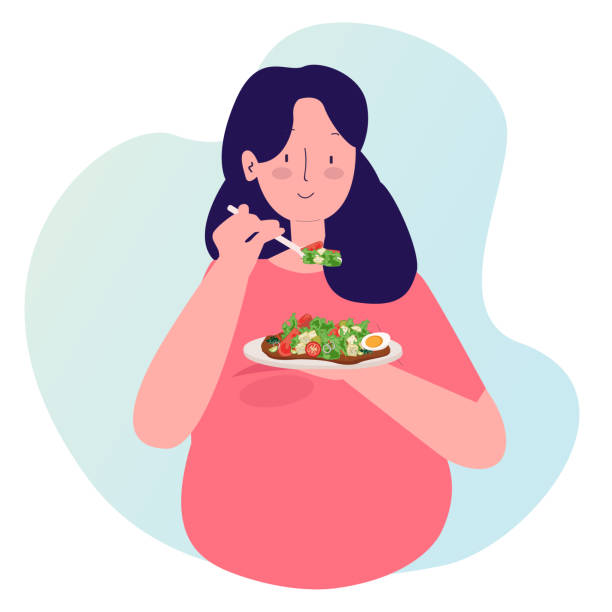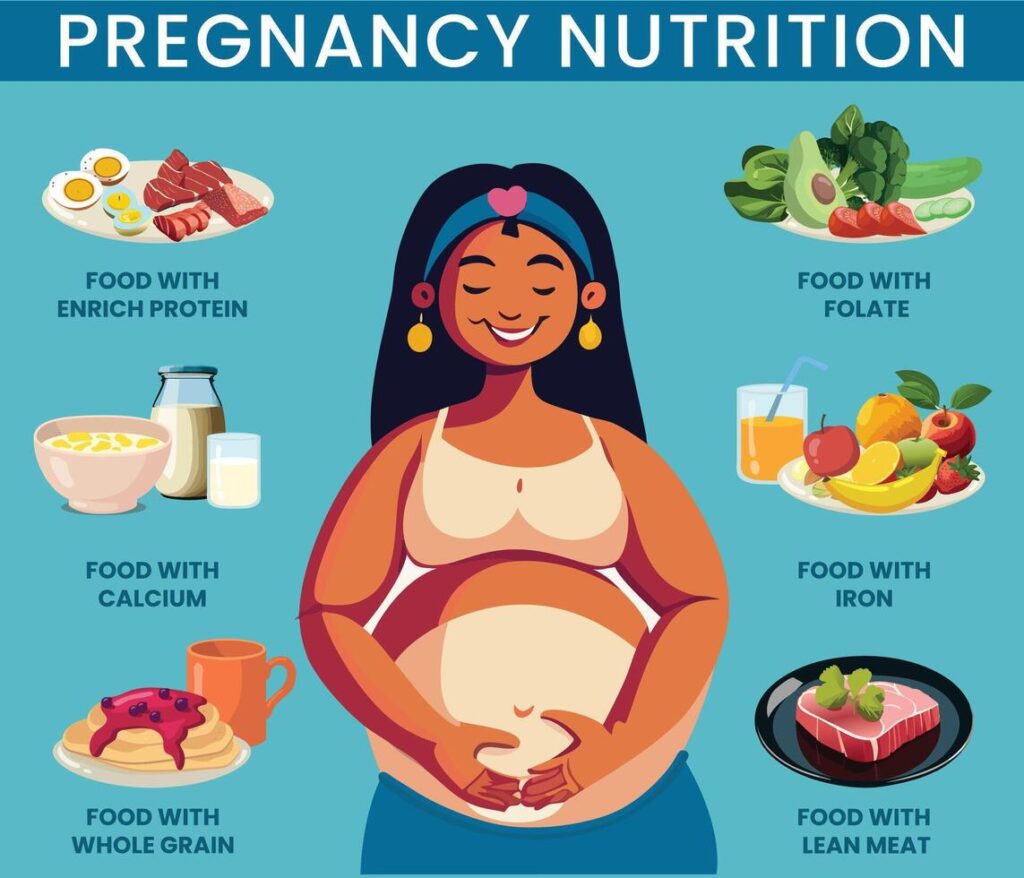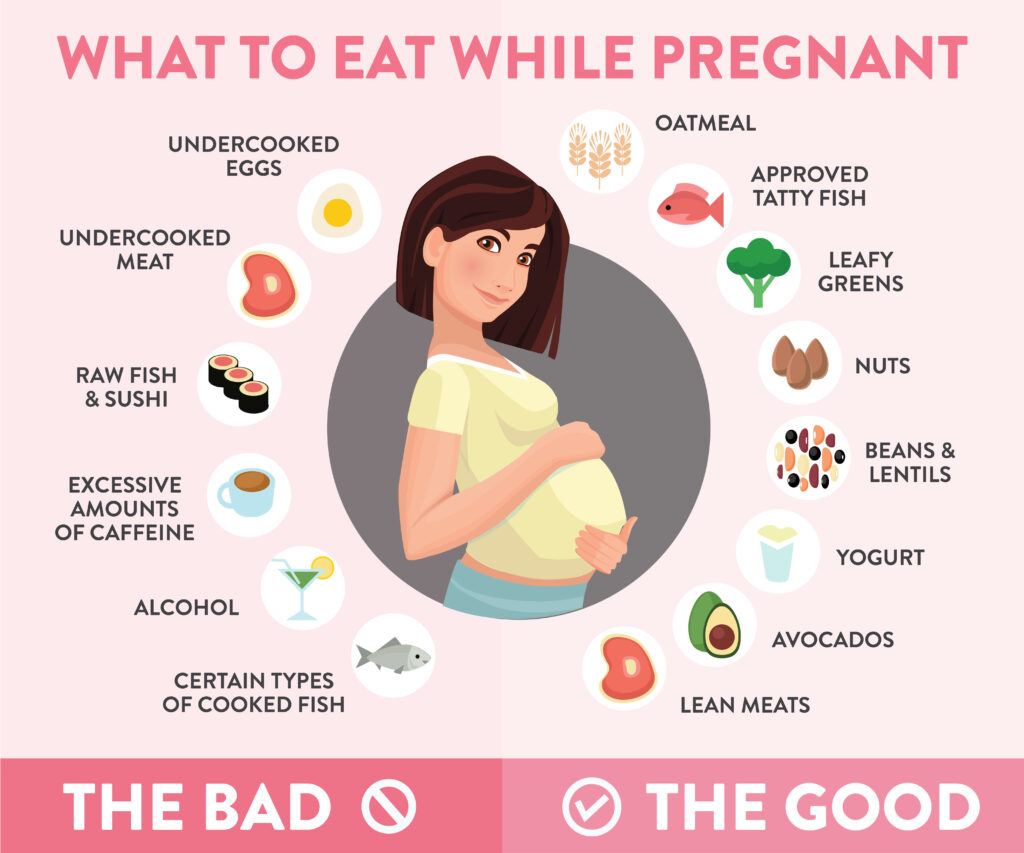Pregnancy is a miraculous journey, a time of profound change and joy. As you begin this new chapter, making sure you and your baby are eating well is paramount. A balanced pregnancy diet not only supports your health but also the growth of your little one. In this guide, we’ll explore the essentials of a pregnancy diet, offering practical tips and tasty ideas to help you and your baby.
The importance of a balanced diet:
During pregnancy, your body needs plenty of nutrients to support the growing baby and adjust to the physiological changes you experience. A balanced diet provides essential vitamins, minerals, proteins and fatty acids essential for fetal development and maternal health.

Key nutrients in pregnancy:

Folate (vitamin B9): Folate is important to reduce the risk of atherosclerosis. It supports cell division and DNA synthesis. Folate is found in green leafy vegetables, beans, and fortified cereals, and should be consumed during your pregnancy.
Iron: Your body’s blood volume increases during pregnancy so you need more iron to produce new red blood cells and prevent anemia. Red meat, poultry, fish, legumes and spinach are good sources of iron.
Calcium: This mineral is essential for the formation of your child’s bones and teeth. Dairy products, plant-based fortified milk and leafy green vegetables are rich sources of calcium.
Protein: Essential for muscle growth and repair, protein helps your baby grow. Include lean meats, poultry, fish, eggs, beans and tofu in your diet.
Omega-3 fatty acids: These healthy fatty acids are essential for brain and eye development. Fatty fish like salmon, walnuts and flaxseeds are great sources of omega-3s. Vitamin D: Helps with calcium absorption and supports immune function. Indulging in sunlight, fortified milk and fatty fish can help you get enough vitamin D.
Building your gestation plate: The essentials
A well-rounded diet consists of food groups.
Here’s how to make a balanced plate.

Fruits and Vegetables: Aim for a colorful plate full of fruits and vegetables. They provide essential vitamins, minerals and fiber. Vegetables, spinach, leafy greens, and potatoes are good choices.
Whole grains: Choose whole grains like brown rice, quinoa and wheat bread. Compared to refined grains, they provide more nutrients and fiber, aiding digestion and providing lasting energy.
Lean protein: Include a mixture of protein sources in your diet. Skinless poultry, fish, beans and nuts are good choices. For vegetarians, tofu and tempeh are good choices.
Dairy-milk substitutes: Choose low-fat or fat-free milk with calcium and vitamin D. Fortified almond, soy, or oat milk if you are lactose intolerant or prefer plant-based Could be a good choice than any other
Healthy fats: Include sources of healthy fats like avocados, nuts, seeds and olive oil. These fats support overall brain development and health. Water Supply: Drink!
Staying hydrated during pregnancy is important. Aim to drink about 8-10 glasses of water per day. Adequate hydration helps maintain pelvic floor fluids, increases blood volume, and helps prevent dehydration. You can also hydrate with herbal teas, sodium-free soups, and high-water fruits like cucumbers and melons.
Thirst and stomach management:

Pregnancy usually brings unusual cravings and nausea. While it’s important to listen to your body, try to make healthy choices:
Cravings: If you like sweets or salty foods, try healthier options. For dessert, choose fruit or yogurt with honey. For salty foods, choose eggs or rice crackers.
Constipation: Eating small, frequent meals can help control constipation. Soft foods like crackers, bananas and rice can be soft on the stomach. Ginger and peppermint teas are also known to reduce nausea.
Foods to avoid:

Some foods can be dangerous during pregnancy. Here is what we should avoid.
Raw or undercooked eggs, meat and seafood: This can increase the risk of foodborne illness. Make sure all meat and eggs are thoroughly cooked.
Fish High in Mercury: Limit your intake of mercury-laden fish such as shark, swordfish, and king shark. Choose mercury-free fish such as salmon and tilapia.
Unpasteurized milk: These can carry harmful bacteria. To reduce your risk of infection, stick to pasteurized milk.
Too much caffeine and alcohol: Limit caffeine intake to 200 milligrams per day and avoid alcohol altogether to get the best results for your baby.
Pregnancy diet plan example
Here’s a meal plan sample to help you get started:
Breakfast: Greek yogurt with mixed fruit and granola spread.
Snacks: bananas with a handful of almonds Lunch: Grilled chicken salad with spinach, cherry tomatoes, avocado and vinaigrette dressing.
Snacks: Carrot sticks with hummus.
Dinner: baked salmon with quinoa and roasted broccoli.
Snacks: A small bowl of mixed fruit or whole grain toast with nut butter.
Final Thoughts:
Maintaining a healthy diet during pregnancy allows for a healthy baby and a smooth pregnancy journey. Focus on a variety of fiber-rich foods, stay hydrated and listen to your body’s needs. Remember that every pregnancy is different, so it is always best to consult with your healthcare provider or registered dietitian for personalized advice.
Embrace this wonderful time with a balanced nutritional strategy, and you’ll give yourself and your baby the best possible start on this wonderful journey.
FAQs:
- What are the best sources of folate for pregnant women?
Answer: Folate, also known as vitamin B9, is important for reducing the risk of neuromuscular defects and supporting overall fetal growth. Good sources of folate are:
Leafy greens: Spinach, kale, and romaine lettuce are high in folate.
Legumes: Potatoes, lentils and chickpeas provide adequate amounts of folate.
Fortified grains: Many grains are fortified with folic acid, which is a fortified form of folate.
Citrus fruits: Oranges, grapes and lemons are good sources.
Avocados: In addition to folate, they provide healthy fats and other nutrients.
In addition to these foods, many health professionals recommend taking prenatal vitamins including folic acid to ensure your needs are met.
- How can I manage nausea from pregnancy while maintaining a healthy diet?
Answer: Pregnancy cramps, or morning sickness can make eating a balanced meal difficult. Here are some tips for dealing with constipation and maintaining a healthy diet:
Eat small, frequent meals: Eating small meals throughout the day helps keep your stomach from breaking down, and reduces constipation.
Opt for bland foods: Foods like crackers, toast and rice can be easy on the stomach.
Stay hydrated: Drink water, herbal tea, or clear water regularly. Ginger and peppermint tea is known to help soothe acne.
Avoid strong scents: Strong scents can sometimes cause nausea. Try to avoid foods with strong odors or cook in well-ventilated areas.
Choose protein-rich foods: Protein-rich foods like yogurt, fruit, or cheese can help stabilize blood sugar levels and reduce constipation.
If the rash gets worse or persists, talk to your health care provider for further advice and treatment options.

